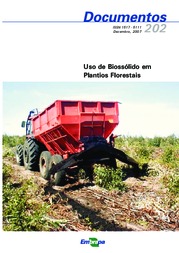Embrapa Agrobiology
 Busca de Publicações
Busca de Publicações
Uso de biossólido em plantios florestais.
Author(s): MORAES NETO, S. P. de; ABREU JÚNIOR, C. H.; MURAOKA, T.
Summary: ABSTRACT: With the increase of the population density in the cities, a great amount of residual waters passed to be generated. The usual practical ones of disposal of the sewage sludge, as the "sanitary and controlled embankment" or the "oustings the opened sky", are alternative of cost to each day more raised or have potential to produce impacts ambient undesirable, beyond constituting, frequently, in focus of problems of public health, through contamination of superficial and underground waters, and of the proliferation of animals and insects vectors of illnesses. Processes come being perfected to get a sewage sludge with biological, physical and chemical characteristics desirable for its use in agricultural areas, as biosolid. Data on the effect of its application in forest ground are mentioned in an extensive way in this work, as well as on the dynamics of elements as nitrogen, phosphorus and heavy metals, which depending on its sum that it is injected in the ground can cause effect undesirable to the environment.
Publication year: 2007
Types of publication: Booklets
Unit: Embrapa Cerrados

